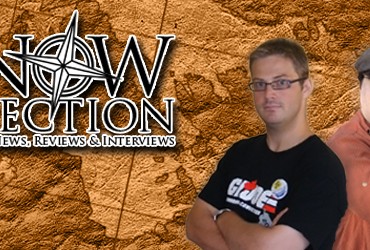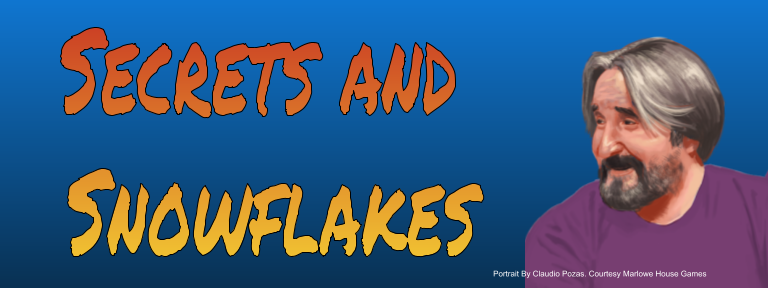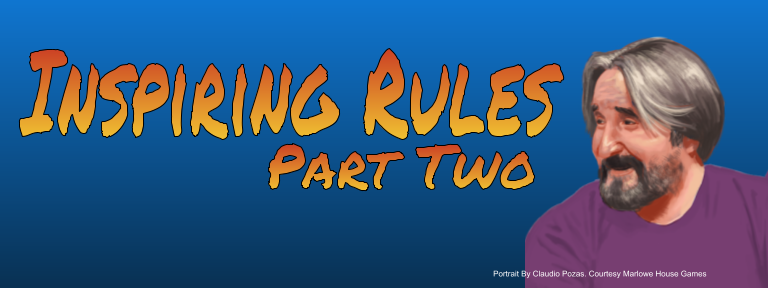Over the course of this blog, I’ve talked a lot about the flexibility of the Pathfinder rules, but much of that discussion was focused solely on how the GM can leverage that flexibility to run exactly the campaign she’d like. The week I’d like to talk character creation.
So, you’re about to begin a new campaign but you’re not behind the screen. Instead, you’re about to be one of the stars of this ensemble show but you don’t know what to play. The robust array of Paizo and quality third party resources means you can pretty much play anything you want. But, where do you look for inspiration?
You Ought To Be In Pictures
If you’re like many gamers you are an avid reader. You could certainly model your next character on Daenerys Targaryen, Sparhawk, or Kaladin Stormblessed. I’ve done it many times but something I typically prefer is to find a character in a non-fantasy TV series or film and build a character from that starting point. I like this method better than fiction because once you file off the distinguishing marks of the original genre you also have a performance you can mimic a bit at the table.
It should be said here, we’re not talking about making a carbon copy of the character just Pathfiderized. You CAN try that and Alex does a fantastic job with that in his Iconic Design column, but even his designs don’t start looking like the characters they’re based on for a few levels at least. Today that’s not our goal, today we’re just looking for inspiration.
Know the Setting
Before settling into a particular character make sure to talk to your GM. Find out what sort of campaign she’s running. If she’s running a Paizo Adventure Path read the corresponding player’s guide pdf. If she’s running a homebrew have conversations about the world as you make your characters.
Paizo has produced over 30 classes for Pathfinder and when you add third party content the number increases significantly. Feeling comfortable with what each of those options can do is daunting for many GMs. As a result, not every GM will be willing to let you play just anything. So, whether she’s running an AP, Homebrew or a hybrid of published and original content it is also helpful to know which Paizo and third party books you’re allowed to use.
Play to Their Faults
Many of the most interesting characters on TV and in Movies are flawed and it is their flaws that help make them compelling. While a brilliant Doctor, Gregory House is abrasive, condescending and struggling with an addiction to painkillers. Mechanical genius Tony Stark has a towering ego and is tortured by tragedies he has been unable to prevent and even more troubled by the pain and suffering caused by the Avengers actions. Jessica Jones is strong and tough but emotionally scarred.
All too often as gamer’s when discussing pop culture figures in game terms we get hung up on what a character can do well and underplay their faults. There aren’t many mechanics that you can use to play to a character’s faults but you don’t need many the drawbacks portion of the optional Traits system and low ability scores should cover most of what you need.
In the late 90’s there was a TV series called Due South. The show was about a Mountie, Benton Frasier, used to tracking poachers and thieves in the Canadian wilderness who takes a consulate job in Chicago and teams with a local police detective to solve crimes. Benton was a fish out of water who somehow thrived. He was kind, polite and naïve, in a city that did not typically reward such traits. So, when we started a 2nd edition Planescape Campaign. I created a wilderness wise paladin based on the Mountie. Again it was a fish out of water experience and indeed my kindness, politeness, and the corresponding naiveté are what made the character memorable. He wasn’t just another stiff Paladin. If I were making this character again today He would definitely get the drawback: Naïve.
To take a more current example. Malcolm Reynolds (Firefly and Serenity) is smart but he may not be all that wise. After the war, he decides to risk everything and become the captain of a cargo vessel. Every year on Unification Day he finds himself in an Alliance-friendly bar just so he tweak loyalist the noses and get into a bar fight. He barrels along through the series often leaping before looking in one episode he jumps into a duel before knowing the rules and it nearly kills him. Sometimes this lack of Wisdom even shows up in the dialog.
Capt. Malcolm Reynolds: Do you want to run this ship?
Jayne Cobb: Yes!
Capt. Malcolm Reynolds: Well… you can’t…
This isn’t to say Malcolm isn’t a great character, he is. But part of his appeal is this recklessness that comes from not being the wisest character in the verse.
Some Tips for Making the Most of Low Stats
Strength: Very low strength characters tend to be frail and thin because they lack muscle mass. A heavyset character despite his mass and potential may still be weak limited by his own girth. You might want to play up this infirmity by partnering with another character who acts as your muscle. While Raymond Reddington of the Blacklist hasn’t demonstrated a particularly low Strength his relationship with Dembe would be a good model for such a relationship.
Dexterity: You might just be clumsy or perhaps you have a permanent injury that requires a cane or the classic peg-leg for a pirate.
Constitution: Unhealthy characters are frequently very over or under weight. These characters become winded easily and would be more susceptible to illness, injury, or the effects of poison. Your character could be suffering from old war wounds, the after-effects of a debilitating disease, or simply old age. As Detective Murtaugh says so often in the Lethal Weapon movies, “I’m getting too old for this sh**.”
Intelligence: Low intelligence characters have limited faculties for reason and study or perhaps they just haven’t had the opportunity to be educated. These characters have limited skills and you may wish to play your character as moderately illiterate. Everett, Pete, and Delmar the heroes of O’ Brother, Where Art Thou are all great examples of low intelligence characters. You could just appear dim like Pete or Delmar or you may try to hide your lack of intelligence or education behind a bunch of lofty sounding but often misused words like Everett.
Wisdom: As addressed above a low wisdom character may be reckless or he may lack common sense or simply be colossally unobservant.
Charisma: Normally charisma is a measure of the strength of your personality. It is rooted in your self-confidence a low charisma character most likely lacks that confidence. So why do you lack that confidence? Many characters who would make great PCs lack self-confidence, unfortunately, Hollywood often leaves the why unstated or understated (especially with female characters). If you are modeling Your PC on a character with a low Charisma try to figure out why they have such a low opinion of themselves. Sometimes it is obvious The Hound is ugly and physically scarred but it is less clear why Kara Danvers (Supergirl) and Clark Kent (Superman) have such poor Charisma when not leaning on their super identities.
Conversely, your character might not lack confidence but be terrible at directing it in a productive and persuasive manner. What your character perceives as a gruff “charm” might be a callous abrasiveness that they fail to perceive. It could also be that the character just doesn’t care for other people’s feelings and has no compunction about just steamrolling through social situations leaving nothing but enemies and emotional wreckage in their wake.
Consider the Ensemble
You aren’t going to be the only character at the table so even if you have decided to play the Cleric version of House M.D. you are not the titular character of the campaign you are part of an ensemble make sure your build isn’t going to interfere with anyone else’s fun. Make sure your concept and build allow others to take center stage in equal measure.
Competency is Relative
Remember, just because you want to play a character based on the best [fill in the blank] in the world in its source material doesn’t mean you’ll even be the best [fill in the blank] in your group let alone the game world. That’s okay. Just build a character whose competencies follow some sort of internal logic. If you are building a first level vigilante based on Superman you aren’t going to be able to bend steel but Strength and Constitution should probably not be your dump stats but don’t worry if the young half-orc Atreyu is stronger or healthier.
Keep your numbers internally consistent and as you level build towards your ideal version of the character.






